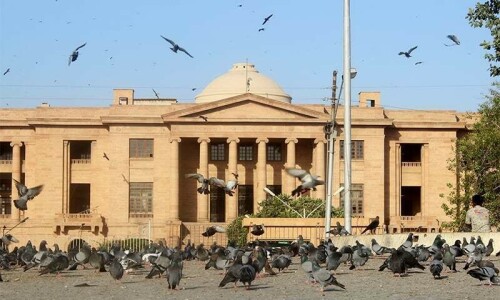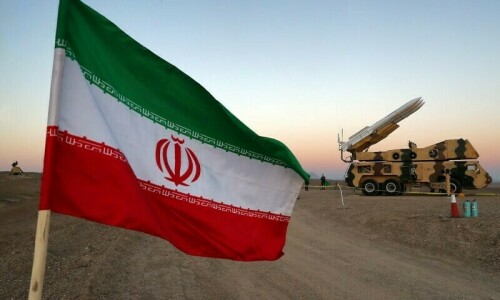KARACHI, Oct 15: The institution of the Ombudsman is not performing optimally as many of its judgments are set aside by the executive every year. There are two main reasons for this.
Firstly, the ombudsman’s decisions can be set aside rather arbitrarily, resulting in an injustice. Secondly, in many cases people not properly schooled in legal matters, and largely devoid of the requisite experience, have been made federal or provincial ombudsmen.
There is a need, therefore, to revisit the law relating to the ombudsmen, said Justice (retd) Haziq-ul-Khairi during an informal meeting with Dawn the other day. He said the president and governors were advised by people whose legal acumen was not sound.
Even otherwise, said Justice Khairi, the power to set aside the ombudsman’s decisions may be exercised arbitrarily or for reasons of expediency. Asked if he was satisfied with the law, he said: “I am not entirely happy with the present law particularly in regard to representation before the president or governor against the visions of the federal or provincial ombudsman.
“They (the president and governors) are invariably advised by persons whose legal acumen is not as sound, resulting into injustice to the aggrieved persons.” Although anyone can be inducted as the provincial ombudsman, there was a need to appoint only those persons who possess degrees in law and also ‘adequate background’.
Justice Khairi, a former ombudsman of Sindh, said in one case he had ordered that, since there was no water connection into the premises of a complainant, no water tax was payable to the Karachi Water and Sewerage Board. “But my order was set aside.”
Similarly, he said, in another case KDA had auctioned a commercial plot and knowingly concealed that it was under encroachment. It further threatened to cancel the deal and forfeit the deposit unless payment of the balance amount was made by the allottee.
“I considered it a fraud by a statutory public body on a citizen, therefore, I ordered that he should be given back his money on the basis of market value of Pakistan rupee against dollar then prevailing, that is seven years back. This order was also set aside without assigning any reason.”
Asked what relief had he provided to the public during his tenure as a provincial ombudsman, Justice Khairi said: “Although the better judge are the people, however, during my tenure I came across the worst type of maladministration in the public housing schemes, whether it was the Hawkesbay Scheme, Malir Development Scheme or Kohsar Housing Extension.
“Public money running into billions of rupees was spent on other projects or appropriated against salaries of staff. Land was encroached upon by land-grabbers or illegally transferred to others by our politicians and bureaucrats. The position is much better now and development work has started.”
He said shifting of the Sabzi Mandi to its new site was an onerous task, assigned to him by the Supreme Court of Pakistan. The documentary and ocular evidence of the case brought to the fore maladministration of the highest order in which the politicians and bureaucrats were fully involved.
With the shifting of the Sabzi Mandi, Karachi now had the largest fruit and vegetable market in Asia, spread over 100 acres of land. Justice Khairi expressed the hope that a park will be provided to the citizens of Karachi on the 17 acres of land vacated as a result of the shifting.
Another serious matter which came up before him related to the hundreds of pensioners to whom pension amounts could not be paid for want of funds, said Justice Khairi. He intervened in the matter and on his instructions and directives of the authorities, funds from rich local councils were transferred to poor local councils and this way the grievance was redressed.
In response to a question regarding other functions of the Mohtasib, he pointed out that the law provided for the setting up of regional ombudsman offices wherever necessary. There was one regional office in Sukkur when he took over. During his tenure he opened three more regional offices in Hyderabad, Larkana and Mirpurkhas.
These regional offices were functioning successfully, he claimed. Likewise, an ombudsman might take suo motu action and during his tenure he had dealt with 50 suo motu cases, including cases on: gutka and supari; encroachment of police and others on amenity and private plots; Wazir Mansion; non-registration of private schools; noise pollution of auto-rickshaws; and, ladies’ compartments in busses or coaches.
“Apart from this, I constituted two permanent commissions, one to monitor illegal detections in Sindh and the other to monitor disbursement of Zakat and the like to the Mustahiqeen”. The Ombudsman may also arrange studies and conduct research to ascertain root causes of corrupt practices and injustice and recommend appropriate steps for their eradication.
“Accordingly I arranged seminars, the first on ‘Road Accident: Causes and remedies’, the second on ‘Town planning’, the third on ‘Solid Waste and Hospital Waste’, the fourth on ‘Save Hyderabad’ and the fifth on ‘Conditions of Graveyards’.”
“The second, fourth and fifth seminars were held for the first time in Pakistan. The recommendations of the seminars were published by the Ombudsman Secretariat, Sindh. It is heartening to note that the Government of Pakistan has allocated Rs10.5 billion to save Hyderabad.
“Similarly studies and research work were carried out, first among them was ‘The Technical Report on New Sabzi Mandi’, followed by reports on ‘Conditions Prevailing in Women and Juvenile Prisoners’, ‘Status of Safe Drinking Water: Availability in Sindh’, ‘Conditions in Slaughterhouses and Sale of Meat in Karachi’ and lastly on ‘Conditions of Prisons in the Province of Sindh’.
“On the eve of my retirement I got published the ‘Twelve Years’ Selected Cases of Ombudsman Sindh”. Regarding action which can be taken by the ombudsman to restrain the administration from wrongdoing, Justice Khairi said at times when flagrant violation of law and public interest was involved he would pass prohibitory orders against the agencies and its officers.
“It was reported in the press that the police was constructing a police station on a park meant for women and children in Bahadurabad. This was stopped and structures raised by police were ordered to be dismantled within 24 hours.
“Similarly a Bachat Bazaar with 400 shops was established in Jehangir Park, Saddar, which was also removed on a 48-hour notice. A mosque illegally under construction on someone’s plot could not be demolished initially because of a possible law and order situation. However, later it was demolished as per my order at midnight.”
In another case, he pointed out, a landlord in collusion with an SHO had thrown out a practising doctor from his clinic on Sharea Faisal. Within two days, possession of the clinic was restored to the doctor and the SHO who had ‘failed’ to appear before him was brought to him after being handcuffed.
When asked whether an ombudsman had such powers under the law, Justice Khairi said an ombudsman was supposed to redress and rectify an injustice done to a person through maladministration. An ombudsman should not keep his eyes closed to maladministration of such magnitude.
He, or any member of his staff authorised by him, was empowered to enter and search any premises and empowered to seal any article or document, he said. An ombudsman enjoyed powers of contempt when his orders were violated.
He can also refer a case to the president or governor for defiance of his recommendations. “When I assumed the office of Ombudsman, Sindh, I found that despite directions of the ombudsman, KDA had failed to allot alternate plots of even 16, 40 or 80 square yards to the aggrieved persons which impelled me to restrain the KDA from auctioning any plot till such time alternate plots were provided to them. Ultimately the plots were allotted to all these persons.”
Asked how was he able to get his orders implemented, especially with rampant corruption, Justice Khairi said there were a number of honest and God-fearing officers who came out to help him in discharging his duties. Besides, most of the time the governor had remained a source of strength for him.
Regarding the accountability systems in other countries, he recalled that during his tenure he had attended Asian Ombudsman Conferences in Manila, Tokyo and Beijing. “Recently I visited Sweden, England and France and met their ombudsmen whereas my advisers visited Turkey, Greece and Southeast Asian countries to examine their systems of administrative justice.”
Asked which system was the most impressive, Justice Khairi said Sweden was a model country in this regard. “They have a parliamentary ombudsman who supervises and ensures observance of law by the judges and public officials.
“He takes up complaints where delay is caused in disposal of court cases. He may himself institute and prosecute legal proceedings against a member of the Supreme Court or the Supreme Administrative Court.
“If a minister has acted unlawfully he is tried before the Supreme Court and prosecuted by a parliamentary ombudsman. He draws attention to deficiencies in law and regulation and proposes improvements. At times he intervenes in a court case where a stiffer penalty is awarded than the law permits or where the court excels its power in some way. His decision is not appealable.
















































